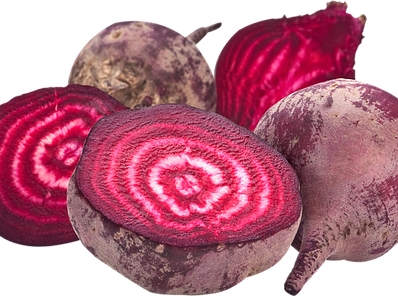Beets
- jlrosner
- Jan 13, 2020
- 3 min read
Updated: Jul 28, 2020

The ancient Romans were one of the first civilizations to cultivate beets and use their roots as food. Prior to this time, people exclusively ate the beet greens rather than the roots. The value of beets grew in the 19th century when it was discovered that they were a concentrated source of sugar.
Both beets and Swiss chard are different varieties within the same plant family and their edible leaves share a resemblance in both taste and texture. Attached to the beet's green leaves is a round or oblong root. Beets come in a variety of colors- reddish-purple, white, golden/yellow or even rainbow color roots. No matter what their color, beet roots aren't as hardy as they look and can be easily damaged.
Beets' sweet taste reflects their high sugar content, which makes them an important source for the production of refined sugar. The greens attached to the beet roots are incredibly rich in nutrients, concentrated in vitamins and minerals as well as carotenoids.
Nutrient Profile: Beets contain a rich array of unique phytonutrients. They are also an excellent source of folate and a very good source of manganese, potassium, and copper. They are also a good source of dietary fiber, magnesium, phosphorus, vitamin C, iron, and vitamin B6.
Health Benefits:
Antioxidant benefits: The combination of betalin, manganese and vitamin C allow beets to provide antioxidant support in a different way than other antioxidant-rich vegetables.
Anti-inflammatory benefits: Many of the unique phytonutrientspresent in beets have been shown to function as anti-inflammatory compounds. These anti-inflammatory molecules may eventually be shown to provide cardiovascular benefits in large-scale human studies, as well as anti-inflammatory benefits for other body systems.
Support of Detoxification: The betalain pigments present in beets have repeatedly been shown to support activity in our body's detoxification process. This helps in aiding in the elimination of toxins that require glutathione for excretion.
Selection and Storage: Choose small or medium-sized beets whose roots are firm, smooth-skinned and deep in color. Avoid beets that have spots, bruises or soft, wet areas, all of which indicate spoilage.
Do not wash beets before storing. Place them in a plastic bag and wrap the bag tightly around the beets, squeezing out as much of the air from the bag as possible, and place in the refrigerator where they will keep for up to 3 weeks. Store the unwashed greens in a separate plastic bag squeezing out as much of the air as possible. Place in the refrigerator where they will keep fresh for about four days.
Tips for preparing beets: Rinse gently under cold running water, taking care not to tear the skin, which helps keep the health-promoting pigments inside. Since beet juice can stain your skin, wearing kitchen gloves is a good idea when handling beets. If your hands become stained during the cleaning and cooking process, simply rub some lemon juice on them to remove the stain.
Unlike some other food pigments, betalains undergo very steady loss from food as the length of cooking time is increased. To achieve the maximum betalain benefits keep beet steaming times to 15 minutes or less, and roasting times under an hour.
Individual concerns: Beeturia: Consumption of beets can cause urine to become red or pink in color. This “beeturia" is not considered harmful. Persons with iron deficiency, iron excess, or known problems with the metabolism of iron are more likely to experience beeturia.
It is possible for beet consumption to bring a red color into your bowel movements as well. The production of a reddish color in the stool due to beets is not considered harmful; however, it is important to be confident that the reddening of the stool is caused by the pigments found in beets and not by the presence of fresh or dried blood.
Oxalates: Beets (notably beet greens) are among a small number of foods that contain measurable amounts of oxalates (naturally occurring substances found in plants, animals, and human beings). When oxalates become too concentrated in body fluids, they can crystallize and cause health problems. For this reason, individuals with already existing and untreated kidney or gallbladder problems may want to avoid eating beet greens.
Recipe suggestion:
Wrap the beets in aluminum foil and roast at 400F for 45 minutes, until they are tender.
Let them cool, then easily rub off the skin under running water.
Cut them into chunks.
Serve in a salad alongside zesty citrus, crunchy walnuts and salty feta cheese.

Comments